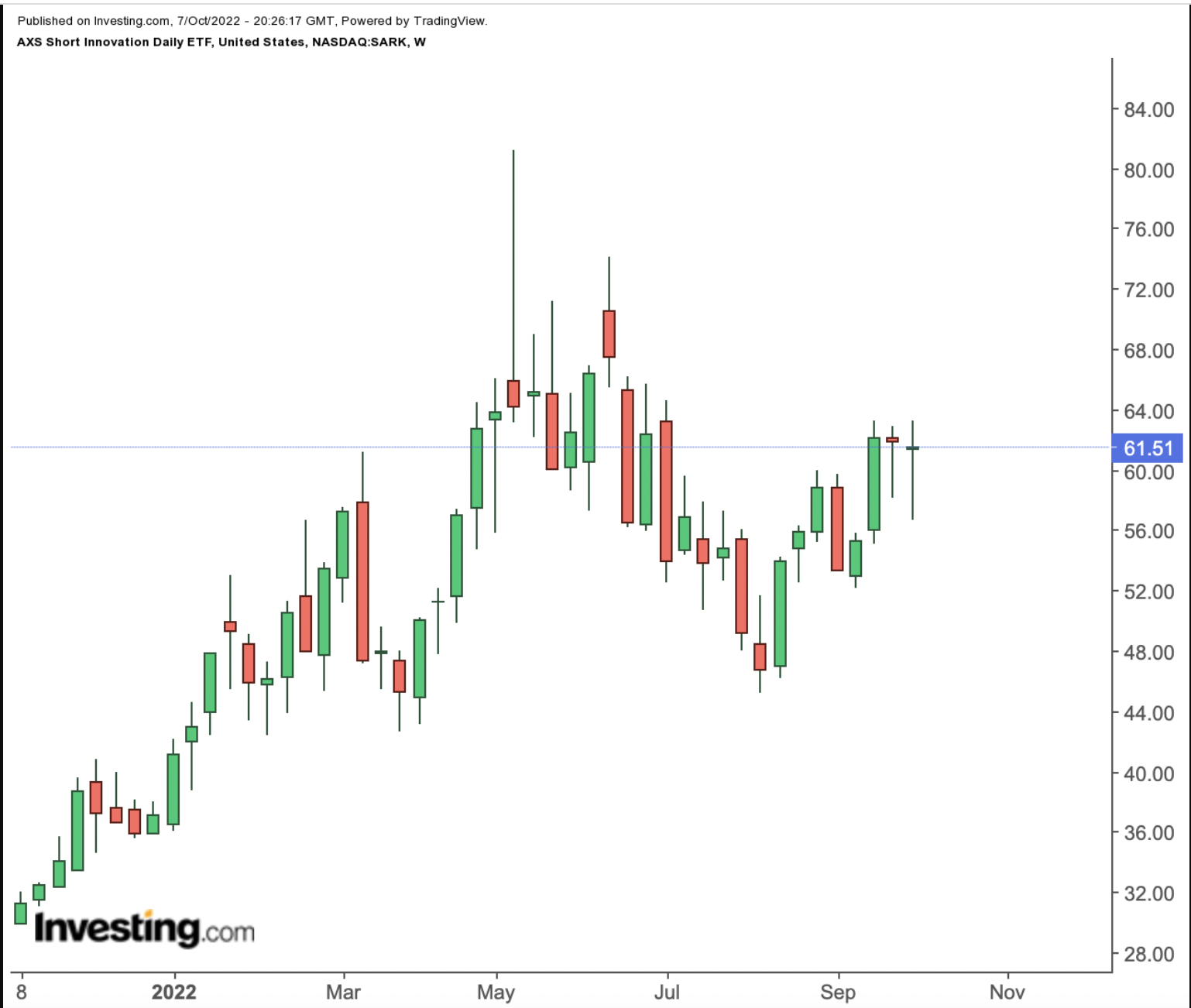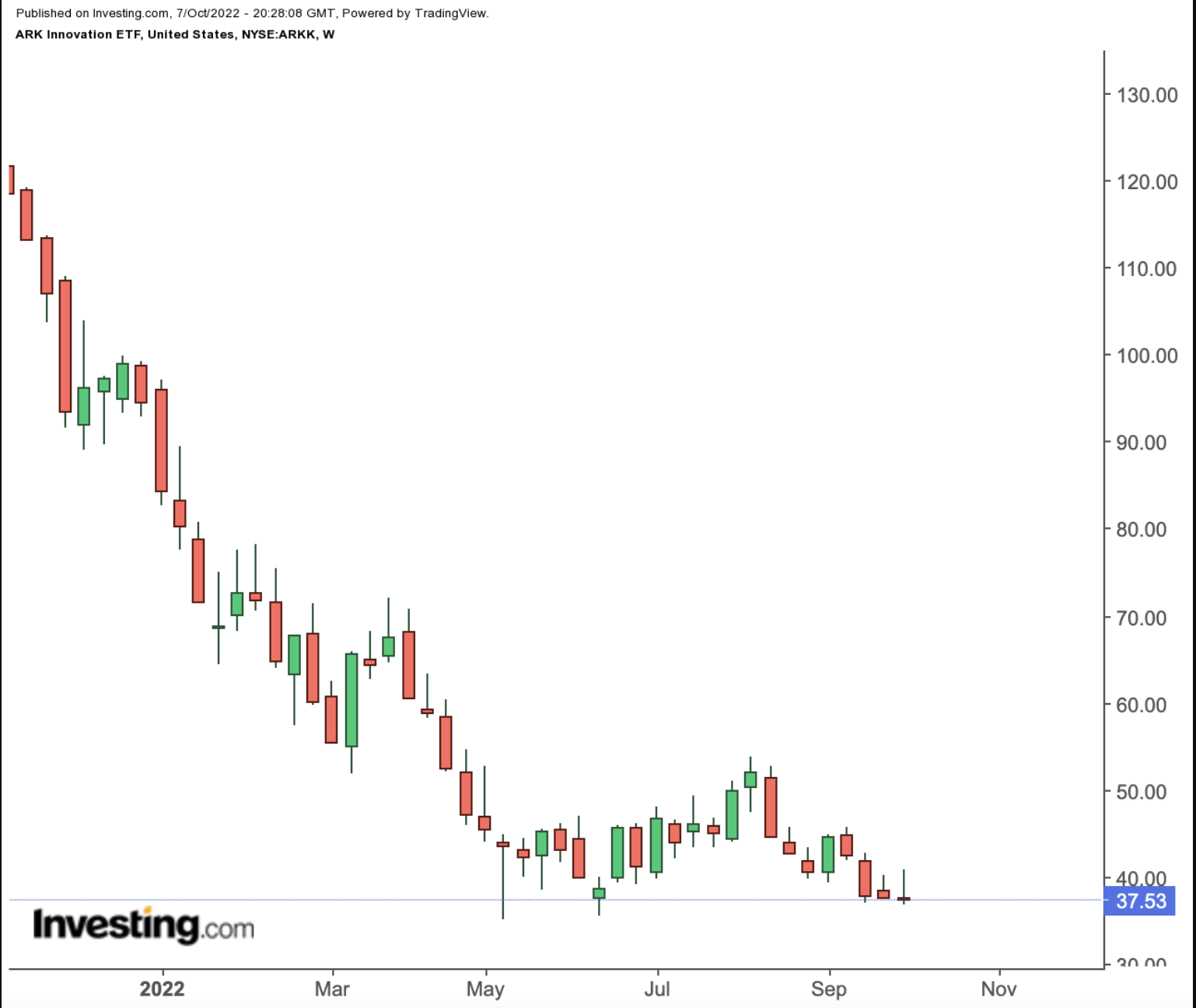Was it a rally? Or, just volatility? That is the kind of week it has been.
But there were a few interesting developments for market watchers to keep their sense of humor amidst the swings.
First up was Matthew Tuttle. This is no joke, but it will certainly bring a smile to some faces. The CEO and chief investment officer of Tuttle Capital Management this past Wednesday filed to launch two exchange-traded funds that aim, in essence, to do the opposite of what TV investing personality Jim Cramer does.
The aptly named Inverse Cramer ETF and the Long Cramer ETF have the proposed tickers SJIM and LJIM. Basically, one aims to go long and the other short.
There is a certain audience of investors who love to hate Cramer. And, I guess, Tuttle is among them. So much so, he is seeking to make money from it.
This is not the first time Tuttle has launched an inverse ETF. He is behind the reverse-ARK ETF known as AXS Short Innovation Daily ETF (NASDAQ:SARK), which was the first such fund to take an inverse exposure to an existing ETF when it launched in 2021. In this case, SARK aimed to go in the opposite direction of Cathie Wood’s well-known $7.4-billion Ark Innovation ETF (NYSE:ARKK).
Since its launch in November 2021, SARK has gained almost 67%. ARKK has lost about the same percentage.

Source: Investing.com

Source: Investing.com
Although ARKK discloses its positions on a daily basis, Cramer will pose a bigger challenge to track. He seems to riff freestyle, almost rapper-like when he’s on the air and often just takes to Twitter. It is not quite clear from the filing how the new reverse-ETF plans to track him.
According to the filing, the fund “seeks to provide investments results that are approximately the opposite of, before fees and expenses, the results of the investments recommended by television personality Jim Cramer.”
By way of specifically explaining tracking Cramer it says this:
“Under normal circumstances, at least 80% of the fund’s investments is invested in the inverse of securities mentioned by Cramer.
“The fund’s adviser monitors Cramer’s stock selection and overall market recommendations throughout the trading day as publicly announced on Twitter or his television programs broadcast on CNBC, and sells those recommendations short or enters into derivatives transactions such as futures, options or swaps that produce a negative correlation to those recommendations. The fund goes long on stocks or ETFs that represent sectors that Cramer is negative on.”
Cramer has long been the target of criticism, stemming back to a much hyped on-air confrontation in 2009 with late-night television host Jon Stewart, host of The Daily Show with Jon Stewart. That in-your-face face-to-face exchange came after Stewart heaped criticism on CNBC for misjudging the financial crisis. Needless to say, Stewart popularized criticizing Cramer. The episode was The Daily Show’s second-most viewed show, attracting an estimated 2.3 million viewers.
Cramer has decent ratings on CNBC, but, who knows, the opposite-to-Cramer movement could have a rival following.
All A-Twitter
Another amusing saga that might bring a smile to your face during these volatile times is the ongoing tale: Elon Musk Buys Twitter, the seven-part-non-scripted-it-could-be-a-Netflix series.
In the latest episode of this will-he-or-won’t-he docu-drama, the richest man in the world lists the banks and financial institutions that might get swept up in playing some sort of supporting role in this $44-billion deal.
In a nutshell, Musk has pledged $46.5 billion in equity and debt financing for the deal. This represents the acquisition along with closing costs. Two banks – Morgan Stanley (NYSE:MS) and Bank of America (NYSE:BAC) – have committed to kick in $13 billion to debt financing support.
But Twitter is worrying out loud about whether that support is actually there. It’s a sign company officials are still not convinced Musk will follow through on his claim he intends to close the deal by Oct. 28, the limit set by a court after Twitter filed a suit against the Tesla CEO after he reneged on his initial bid to buy the company.
Part of the deal Twitter is concerned about is Musk’s need to secure about $22.4 billion to cover equity financing.
But in the meantime, interested viewers are keeping an eye on Tesla (NASDAQ:TSLA) stock. It has lost 15.9% in the past week, earning it the top spot on the week's biggest losers' list (see below). There is more than one reason for this to be happening now.
One, the electric car maker reported weaker-than-expected vehicle deliveries last Sunday. In reaction, the stock dropped just over 8.5% last Monday. And continued to slip throughout much of the week.
Which brings us to the second reason, which is, in part, more closely related to Musk’s Twitter financing predicament.
Stay tuned for another episode next week. I will keep you posted when this whole ordeal really does make it to Netflix.
Top Winners And Losers Of The Week
Again, for all those out there who are keeping score, here are the top gainers of the past week:
On the S&P 500
- DexCom Inc (NASDAQ:DXCM): +26.82%
- APA Corporation (NASDAQ:APA): +24.36%
- Marathon Oil Corporation (NYSE:MRO): +23.87%
- Halliburton Company (NYSE:HAL): +23.60%
- Devon Energy Corporation (NYSE:DVN): +19.89%
On the NASDAQ Composite
- Pineapple Holdings Inc (NASDAQ:PEGY): +337.13%
- Green Giant Inc (NASDAQ:GGE): +48.18%
- Engine Media Holdings Inc (NASDAQ:GAME): +34.87%
- Agenus (NASDAQ:AGEN) Inc.: +30.73%
- Richardson Electronics Ltd (NASDAQ:RELL): +29.14%
And the biggest losers:
On the S&P 500
- Tesla Inc (NASDAQ:TSLA): -15.90%
- Generac Holdings (NYSE:GNRC): -13.42%
- American Tower Corp (NYSE:AMT): -9.33%
- SolarEdge Technologies (NASDAQ:SEDG): -9:21%
- Welltower (NYSE:WELL) Inc.: -8.89%
On the NASDAQ Composite
